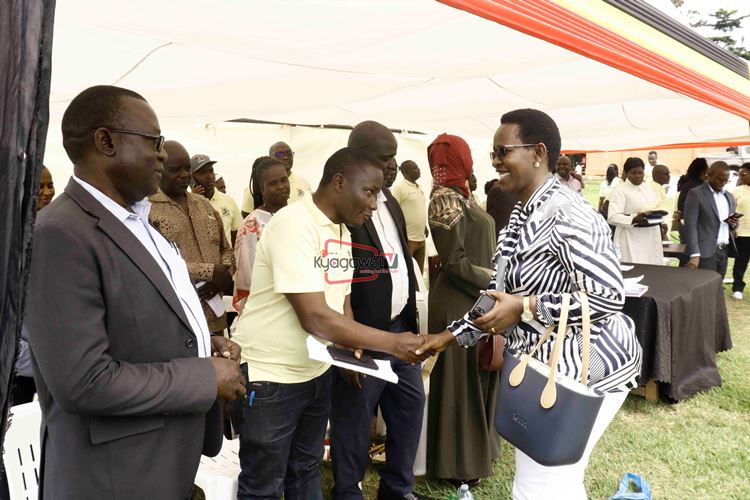The government through the Ministry of Health has vowed to double efforts in the fight against preeclampsia, the second leading killer of women in Uganda. The permanent secretary Ministry of Health, Dr. Diana Atwine said this will be achieved through strengthening the efforts in improving access to information, knowledge, screening and care for patients with preeclampsia in the country.

Atwine was on Saturday presiding over the International Preeclampsia day commemoration at the function which was held at Kisowera Primary School in Nama sub-county, Mukono district.
The commemoration ran on a theme: “High Blood Pressure in Pregnancy Kills: Know, Screen and Act.”
According to Dr. Atwine, preeclampsia is the condition where a pregnant mother develops high blood pressure, a very deadly condition which in most of the cases comes unnoticed.
Dr. Richard Mugahe, the deputy commissioner in charge of reproductive and infant health last year, Uganda registered 1.5m new born babies and lost 1,200 mothers during or after giving birth.
Prof. Annet Nakimuli, the Dean of Makerere University Medical School who heads the National Safe motherhood expert committee said out of 100 mothers who die during or after birth, 14 die as a result of preeclampsia.
However, Dr. Atwine said that the country has continued to make strides in maternal and newborn health.
“Over the past six years, we have managed to make a 15% reduction in our institutional mortality rate from 108 to 84.7 per 100,000 live births. Over the same period of time, our institutional perinatal mortality rate has also reduced by 36.4% from 29.1 to 18.5 per 1000 live births,” she said.

She also said that the government resolved to draw health services closer to people, as one of the means of improving the health services in the country.
By doing so, Atwine said they have managed to increase the number of Health Centre IVs that perform caesarean section by 23.5% and those that can provide blood transfusion services by 32.5%. She added that they are committed to ensuring 100% Health Centre IV functionality.
“Some of the key investments that we have made as a sector include the upgrade of 371 Health Centre IIs to Health Centre IIIs and the construction of an additional 352 facilities. A number of our mothers deliver from these lower facilities. We therefore need to invest in these infrastructural projects,” she said.

She added: “We have installed over 70 blood fridges and continue to procure more equipment including delivery beds, operating tables to enable us to address the equipment gap. I therefore encourage each district with equipment challenges to formally raise such matters to my office so that we can plan and support.”
Dr. Atwine however said that despite those achievements, the country still grapples with preventable maternal and perinatal mortality.
She said that preeclampsia alone contributed 15% of the maternal deaths which the country registered in the last financial year 2021-2022.
“This is second to postpartum haemorrhage which contributed 40% of the preventable maternal deaths which were registered. It’s important to also highlight that preeclampsia makes a significant contribution to preterm births and from our annual health sector performance report, preterm deaths were the leading cause of death among the new born babies,” she noted.
Atwine also highlighted that most maternal and perinatal deaths which occur due to preeclampsia are preventable if risk factors and symptoms are promptly detected and adequately managed during the antenatal, intrapartum and postpartum periods.

She noted among others, the increased attendance to antenatal care, increased screening and prompt action for mothers with Positron Emission Tomography (PET) as efforts to ensure that the essential commodities are availed in a timely fashion continues.
She also challenged the community saying as the government plays its role, they also have a role to play; among others are; birth preparedness and support from men towards their wives when they are pregnant.
“Such will improve both maternal and perinatal outcomes and ensure that the mothers prepare early for birth, delivering in health facilities with skilled birth attendants but not from traditional birth attendants, which will enable early detection and treatment of any complications,” he said.
He added: “Identification of risk pregnancies or danger signs early will enable us to provide the needed care to mothers at risk and improve outcomes.”

Dr. Atwine also noted that the from the annual health sector performance review , Mukono district had law levels of antenatal care attendance mostly for the first visit in the first trimester which is at an average of 24.3% and women attending the 4th antenatal visit at 44.7% and below our national target of 50%.
“We therefore need to increase these indicators if we are to improve early identification and management of mothers with preeclampsia. Attending antenatal care will help us address the triple elimination of HIV, Syphilis and Hepatitis B,” she said.
Mukono deputy RDC, Mike Ssegawa acknowledged President Yoweri Museveni and the government at large for a number of infrastructural developments in Mukono district including the upgrading of Mukono Health Centre IV to a general hospital, construction of an outpatient department and now a theatre at Katoogo Health Centre III, among others.
Women, children and old people received free treatment as the function went on. Also a number of people participated in blood donation.
